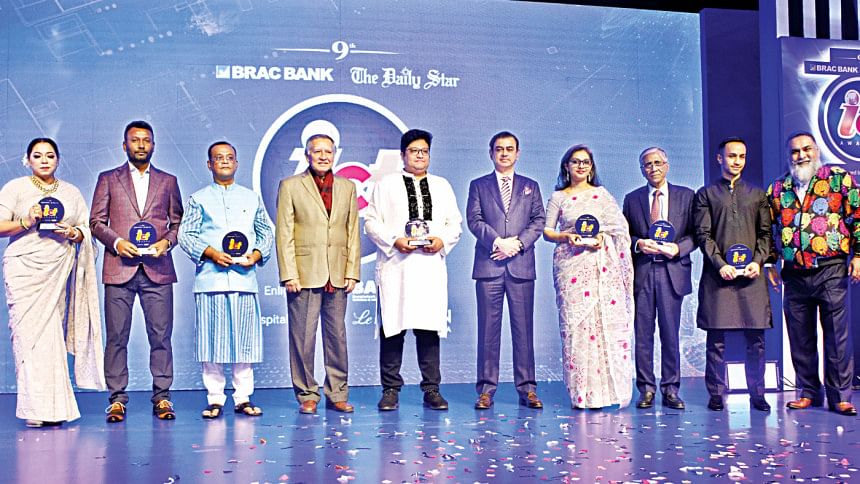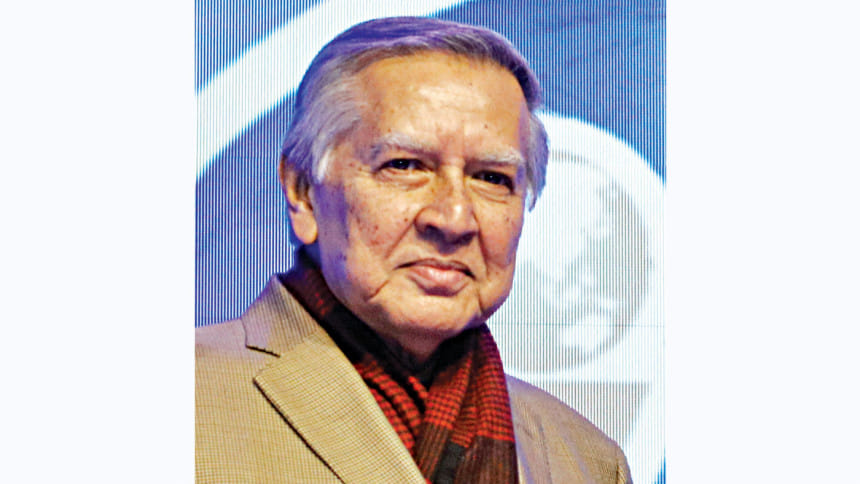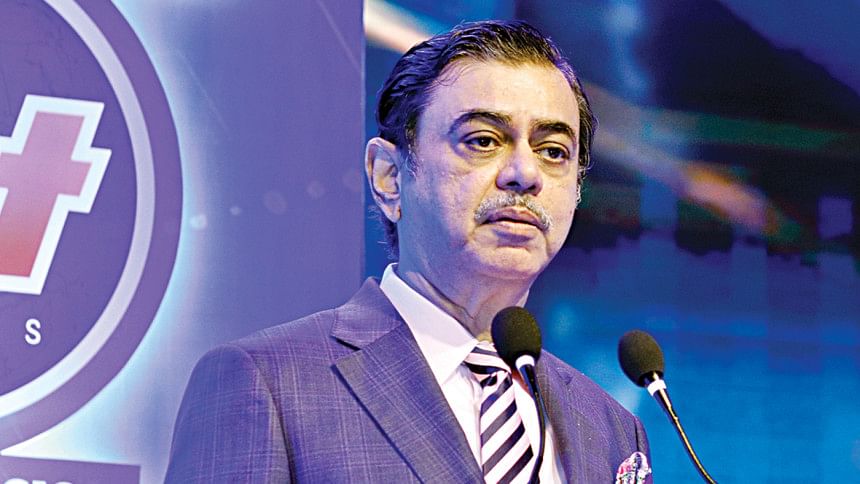ICT leaders honoured

Five companies and two individuals were honoured yesterday at the 9th BRAC Bank-The Daily Star ICT Awards ceremony in recognition of their exceptional contributions to the advancement of Bangladesh's information and communication technology sector.
Selim RF Hussain, managing director and chief executive officer of BRAC Bank, along with Mahfuz Anam, editor and publisher of The Daily Star, handed over the awards to the winners at Le Meridien Dhaka, the hospitality partner for the event.
The event, which was organised in association with BRAC Bank and Bangladesh Association of Software and Information Services, began with a minute's silence in remembrance of those who lost their lives and for all those injured during the mass uprising that ousted the Awami League regime.
Afeef Zaman, founder and CEO of ShopUp, was recognised as the ICT Business Person of the Year, while Sadia Haque, co-founder and CEO of ShareTrip, was awarded as the ICT Woman of the Year.
Logic Software won the ICT Solution Provider of the Year award in the local market focus category and The Kow Company in the international market focus category.
Software Shop (SSL Wireless) was awarded the Digital Commerce of the Year, while Shikho and Instasure were the ICT start-ups of the year.

"We haven't given the ICT sector enough support, enough importance, enough legal supportive environment, enough financial incentives for it to flourish."
Although ICT has been regarded as the future, it has not been given due importance in Bangladesh, Mahfuz Anam said.
"We haven't given the ICT sector enough support, enough importance, enough legal supportive environment, enough financial incentives for it to flourish."
Only through ICT can Bangladesh catch up with the developed world.
"The application of ICT can advance our health to a much higher standard, provide access to global experts in Bangladesh and connect experts in Dhaka with patients in rural areas. Similarly, in the education sector, whatever we try, whatever money we spend, we cannot keep our education aligned with the evolution of education in the world except through technology."
Besides, the digitisation of the government system could lower corruption overnight, he added.
BRAC Bank MD Selim RF Hussain said there are many who feel that the banking sector should be investing much more in ICT, and perhaps there is something to be said about that.
"The future does belong to ICT usage and we are confident that banks in Bangladesh will continue to invest in and expand their digital banking capabilities in areas such as artificial intelligence and machine learning to improve customer service, fraud detection and prevention and become cost-efficient," he said.
Going forward, banks will increasingly partner with fintech companies to gain access to new technologies and services to stay competitive in the rapidly changing digital landscape.

"The future does belong to ICT, and we are confident that banks in Bangladesh will continue to invest in it and expand their digital banking capabilities in areas such as artificial intelligence and machine learning to improve customer service and become cost-efficient."
"Obviously, this is also an exciting time for banks and financial institutions -- many of them have already significantly upgraded themselves with their digital-first strategies to serve the customers."
The adoption of digital banking channels, implementation of digital onboarding processes (eKYC), use of advanced analytics, development of digital products and services and automation of back-office processes are taking place with great momentum, Hussain added.
Ahmed Kamal Khan Chowdhury, group adviser of SSL Wireless; Shahir Chowdhury, founder and CEO of Shikho; Rafel Kabir, managing director of Instasure; Kowser Ahmed, MD and CEO of The KOW Company; Rumana Ahmed, director at Logic Software; Afeef Zaman and Sadia Haque received the awards.
Also at the event, a panel discussion took place with the theme "Deep dive with founders: Understanding why a large population isn't yet driving tech market growth in Bangladesh".
The biggest problem in Bangladesh is that the data is not accurate, said Adnan Imtiaz Halim, founder and CEO of Sheba Platform, adding that the government data on the number of internet users is misleading.
"If we assume that at least 50 million people in Bangladesh are tech-savvy, meaning they each have a device in hand, the question is why are we still unable to monetise technology? This means there is a choking point in our technology sector."
When forecasts are made on incorrect data, the forecasts turn out to be incorrect, he said, while calling for easy availability of smartphones and cheap internet packages.
In India, what was forecasted to take 40 years was unlocked in just six years because of some policy decisions, Halim said.
Drastic decisions will need to be taken at the policymaking level if the choking points in the technology sector are to be removed.
"There is a learning curve in technology. When we talk about transformation, those traditionally doing business or purchasing need to adopt technology. To make that happen, customers need to be incentivised," he added.
Referring to data which says that around $5 billion leaves the country annually for treatment, moderator AKM Fahim Mashroor, also the founder of BDjobs.com, asked why Bangladesh's health entrepreneurs cannot cater to this huge demand.
"Technology alone will not solve this problem -- that's my strong belief," said Sylvana Quader Sinha, founder and CEO of Praava Health.
The real problem with healthcare is not that patients are struggling to book appointments or go to the pharmacy around the corner.
"I have spoken to many patients to understand why they go abroad for healthcare. The consistent thing I have heard is that they don't trust healthcare in Bangladesh."
Technology can help improve quality. But ultimately, patients need to be seen in person by a well-trained doctor, and they need to be able to trust the quality of lab tests, she said.
Explaining why his firm has not built products for the local market, Raisul Kabir, CEO of Brain Station 23, said: "We actually started internationally and later moved into the local market. After coming here, we noticed that people don't trust Bangladeshi providers."
Also, clients have no problem paying Tk 1.2 lakh to a foreign company, but many hesitate to pay even Tk 14,000 to a Bangladeshi company.
"Bangladeshi entrepreneurs are still not willing to make high payments. This is an area we need to break through," Kabir added.

 For all latest news, follow The Daily Star's Google News channel.
For all latest news, follow The Daily Star's Google News channel. 



Comments